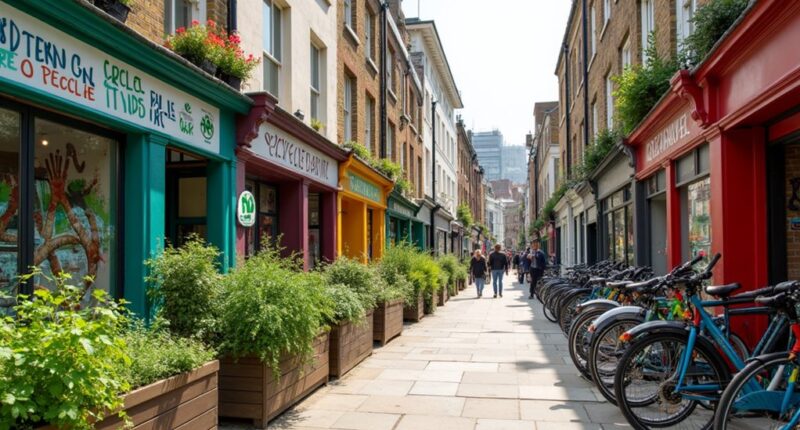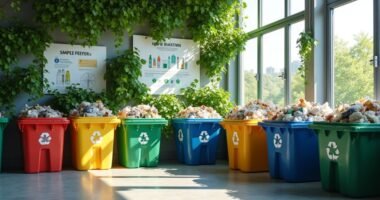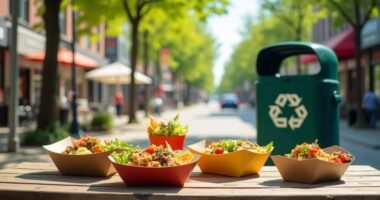London’s 2025 sustainability initiatives are all about making recycling and reuse as trendy as the latest fashion. With a target to recycle 65% of municipal waste by 2030, the city is firing on all cylinders. Events like Climate Action Week engage over 45,000 participants, while innovative projects revitalize textiles and develop zero-waste strategies. It’s a collective effort where community and business unite. Curious about how these efforts are reshaping urban life? More exciting details await.
Quick Overview
- London aims to recycle 65% of municipal waste by 2030, aligning with the UK’s largest recycling initiative for enhanced community engagement.
- Over 700 events during London Climate Action Week engaged 45,000 participants in sustainability activities and citizen science initiatives.
- The Circular Economy Business Support programme has transformed 173 businesses, promoting innovative eco-projects and zero-waste blueprints.
- The ReWear project focuses on revitalizing textiles for reuse, fostering collaboration among retailers and innovators for sustainable product development.
- A 50% increase in polystyrene recycling reflects London’s commitment to accelerating the transition to a low carbon circular economy.
Community-Driven Recycling Initiatives
In the bustling heart of London, community-driven recycling initiatives are not just a trend; they are a demonstration of collective commitment and creativity in tackling waste.
With over 70,000 visits to reuse and recycling centers in August alone, residents are rolling up their sleeves. The newly opened Edmonton EcoPark, boasting a state-of-the-art Resource Recovery Facility, handles more than 300,000 tonnes of material yearly. As Londoners embrace the circular economy, a 50% increase in polystyrene recycling shows their dedication. It’s like a neighborhood potluck, where everyone brings something to the table—not just waste, but a sustainable future. Moreover, the city has set a target for 65 percent of London’s municipal waste to be recycled by 2030, demonstrating a commitment to a greener future. This commitment aligns with the UK’s largest annual recycling initiative, further engaging the community in sustainable practices.
Empowering Local Action for Sustainability
Local action for sustainability is not just a lofty ideal; it’s a vibrant movement that brings together individuals, families, and organizations in London, all enthusiastic to make their mark on the environment.
With over 700 events during London Climate Action Week, 45,000 participants engage in everything from sustainable food festivals to local nature walks.
Grants for community eco-projects encourage grassroots innovation, while citizen science initiatives empower residents to track their carbon footprints. Understanding your carbon footprint calculation is the first essential step toward making meaningful reductions in your environmental impact. Campaigns like the “20 Minute London Makeover” 20 Minute London Makeover unite communities for impactful clean-ups.
Together, these efforts not only beautify the city but also build a stronger, eco-conscious community, contributing to the city’s goal of net zero achievement.
Innovations in Reuse and Circular Economy Practices
A vibrant wave of creativity is sweeping through London, driven by innovative practices in reuse and the circular economy. The Circular Economy Business Support programme is transforming 173 businesses, while the High Streets Beyond Waste pilots are crafting zero-waste blueprints. Start-ups are diverting food waste, creating sustainable products, and sparking job growth. Notably, small businesses represent 99% of London’s businesses, highlighting their crucial role in this transformation. At the heart of these initiatives is a focus on product redesign, ensuring materials remain in use continuously rather than becoming waste. Meanwhile, Circular Economy Week 2025 promises a showcase of fresh ideas, uniting retailers and innovators alike. With initiatives like the ReWear project breathing new life into textiles, London is not just recycling; it’s redefining sustainability, turning waste into opportunity—like turning yesterday’s salad into tomorrow’s kimchi! This year, the event is set to accelerate the transition to a low carbon circular economy, highlighting the city’s commitment to sustainable practices.









